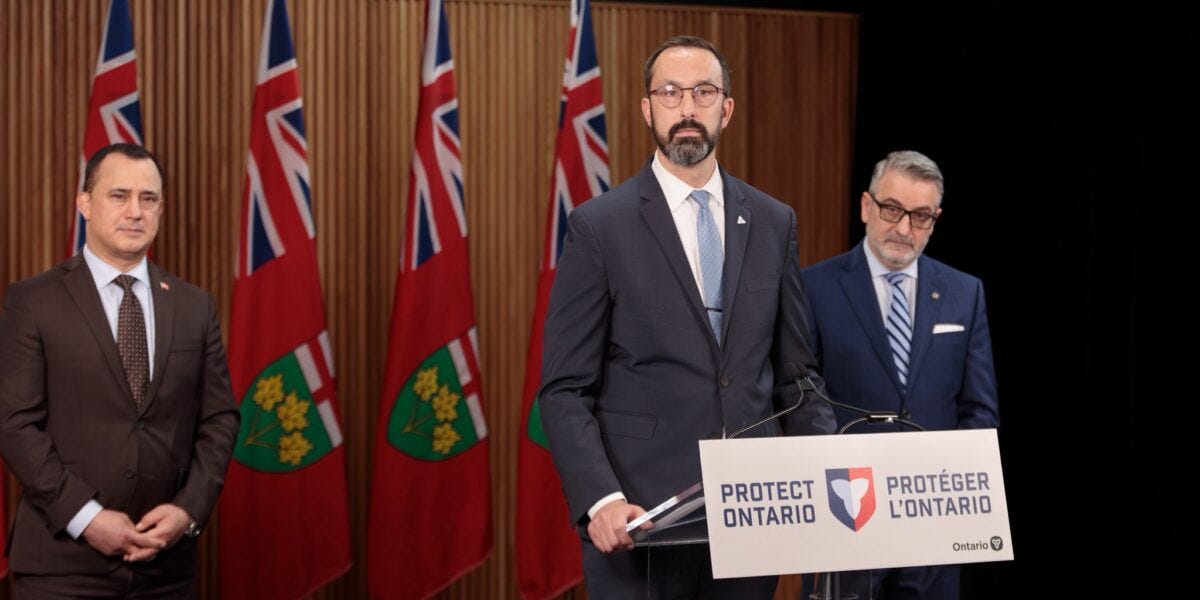Students Under Siege - The Hidden Threats of Ontario's Bill 33
How Doug Ford's “Supporting Children and Students Act” Resurrects Attempts to Wipe Out Student Unions and Institutional Autonomy
Ontario’s Bill 33, the Supporting Children and Students Act, 2025, is being framed as a solution to systemic challenges in education. But beneath the surface lies something far more sinister: a political power grab that threatens post-secondary autonomy, undermines student accessibility, and puts new life into Ford’s previous attempts to dismantle student unions and defund student services.
The bill covers a series of very alarming clauses, including regulating student fees and redefining “merit” in school admissions; showing a government primarily driven by a need to control more than actually addressing the real crisis they have caused in post-secondary: chronic underfunding of public education.
Resurrecting the Failed “Student Choice Initiative”
Bill 33 attempts to resurrect Ford’s failed Student Choice Initiative directive, which in 2019 was a policy that enabled students to “opt out” of fees that support campus services, like student unions, food banks, and mental health programs. That policy was struck down by Ontario’s Divisional Court two years later for violating university autonomy.
But Bill 33 aims to revive Frankenstein’s monster once more, instead introducing a piece of legislation (not simply a directive) that would grant Ford’s Cabinet full power to dictate whatever ancillary fees institutions can charge. This is a move that directly targets student-led services, including student unions.
Remember that Doug Ford said at the time, in 2019: “I think we all know what kind of crazy Marxist nonsense student unions get up to.”

Ancillary fees (ie fees paid outside of regular tuition) are generally small but are essential to ensure student services have regular, consistent funding.
Enabling students to suddenly opt out seriously threatens student unions (who provide an enormous amount of student services, often including food banks, grocery vouchers, academic supports, legal and financial aid services, etc).
Bill 33’s proposal to gut these ancillary fees would not only worsen the student experience significantly, but in many cases make post-secondary more inaccessible to students from disadvantaged backgrounds, who rely on these services.
Eroding University Autonomy & Equity
But Bill 33’s attack isn’t simply limited to student unions. It forcibly requires universities and colleges to adopt provincially-defined “merit-based” admissions criteria.
While it’s framed as promoting “transparency”, this government-approved definition of “merit” threatens decades of progress in better access for groups traditionally excluded from post-secondary. Indigenous, low-income, and students with disabilities often face systemic barriers to education — and this new government checklist would certainly exclude many under its “one-size-fits-all” standards.
Even worse, Bill 33 empowers Ford’s government to override institutional decisions. Section 24 (of Schedule 3) puts provincial regulations above all other legislation, essentially allowing the government to sideline university governance structures.
The bill’s research security requirements and fee regulations are framed as needing to correct institutional leadership failures, but are really a thinly veiled attempt to fully control what gets taught in Ontario’s public education.
As highlighted by OPSEU President, JP Hornick, “This government is using isolated examples of financial mismanagement to justify sweeping changes…instead of addressing the real issue — underfunding.”
Ultimately, this move matches Ford’s broader pattern to centralize power in his and his Cabinet’s hands, from dissolving elected municipal governments to forcing mandates on municipalities and school boards.
A Blueprint for Exclusion
The Ford government’s hyper-fixation on “merit” echoes broader attacks on equity initiatives we’ve seen in Alberta, and the United States. By stripping institutions of flexibility in considering important context (such as socio-economic or other system barriers), Bill 33 risks setting up a “pay-to-play” education system where access to education depends on privilege.
And the time for this Bill is telling. Introduced just weeks before the Ontario legislature breaks for the summer, this bill effectively bypasses meaningful consultation.
Conclusion: A Dangerous Precedent
Bill 33 isn’t just bad policy, it’s a blueprint for wreaking public education in Ontario.
By reviving the failed (and ultimately unlawful) “Student Choice Initiative”, Ford aims to defund student services, dictate admissions standards, and override democratic safeguards in order to consolidate power at the expense of students and institutions.
Bill 33’s passage would set a dangerous precedent for political interference in education across the country, and it will be marginalized communities who will be hit the hardest.
Students across Ontario, from kindergarten to post-secondary, deserve properly funded public education, fair access, and institutions free from government control. Not a government that overrides democratic rights to centralize control and hide from scandal.
But there is still time to take down this Bill.
Contact your local MPP here and tell them that all Ontarians deserve properly-funded and accessible public education, not a politicized Bill 33.










